高中句型习惯用法总结
高中英语语法大全归纳总结-高中语法重点总结
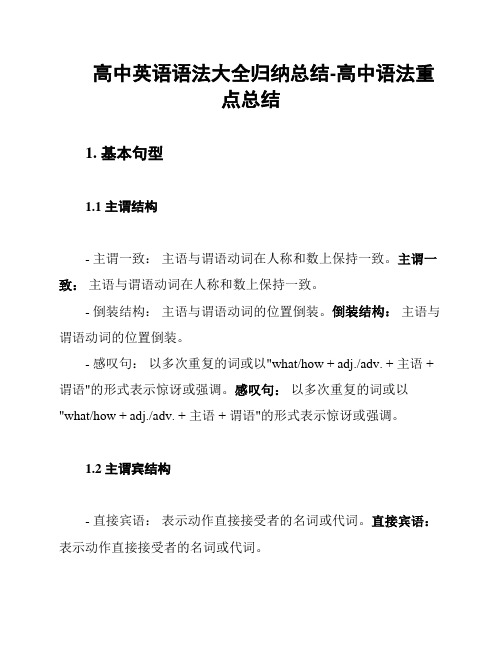
高中英语语法大全归纳总结-高中语法重点总结1. 基本句型1.1 主谓结构- 主谓一致:主语与谓语动词在人称和数上保持一致。
主谓一致:主语与谓语动词在人称和数上保持一致。
- 倒装结构:主语与谓语动词的位置倒装。
倒装结构:主语与谓语动词的位置倒装。
- 感叹句:以多次重复的词或以"what/how + adj./adv. + 主语 + 谓语"的形式表示惊讶或强调。
感叹句:以多次重复的词或以"what/how + adj./adv. + 主语 + 谓语"的形式表示惊讶或强调。
1.2 主谓宾结构- 直接宾语:表示动作直接接受者的名词或代词。
直接宾语:表示动作直接接受者的名词或代词。
- 间接宾语:用来表示动作接受者的人或者事物。
间接宾语:用来表示动作接受者的人或者事物。
- 宾语补足语:用来修饰宾语或者补充宾语的信息。
宾语补足语:用来修饰宾语或者补充宾语的信息。
1.3 主系表结构- 系动词:用来连接主语和表语的动词。
系动词:用来连接主语和表语的动词。
- 表语:用来说明主语状态、性质、特点等的名词、形容词、副词、介词短语等。
表语:用来说明主语状态、性质、特点等的名词、形容词、副词、介词短语等。
2. 时态和语态2.1 时态- 一般现在时:表示经常性、惯性的动作或状态。
一般现在时:表示经常性、习惯性的动作或状态。
- 一般过去时:表示在过去某个时间发生的动作或状态。
一般过去时:表示在过去某个时间发生的动作或状态。
- 一般将来时:表示将来某个时间会发生的动作或状态。
一般将来时:表示将来某个时间会发生的动作或状态。
- 现在进行时:表示正在进行的动作或状态。
现在进行时:表示正在进行的动作或状态。
- 过去进行时:表示过去某个时间正在进行的动作或状态。
过去进行时:表示过去某个时间正在进行的动作或状态。
- 现在完成时:表示过去发生但对现在仍有影响的动作或状态。
现在完成时:表示过去发生但对现在仍有影响的动作或状态。
高中英语语法总结大全
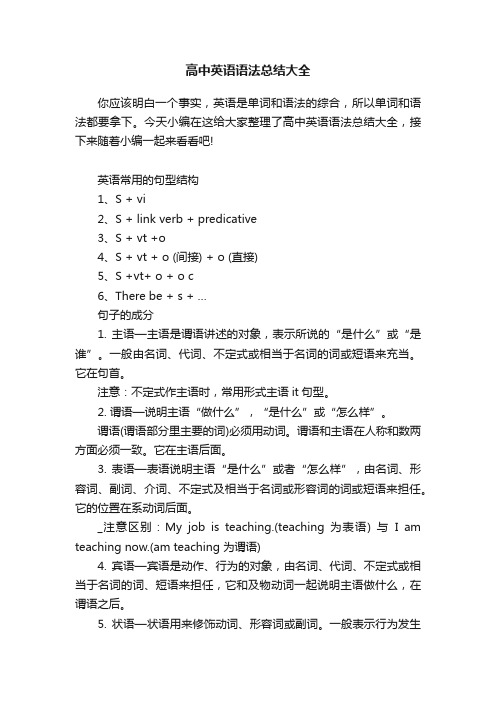
高中英语语法总结大全你应该明白一个事实,英语是单词和语法的综合,所以单词和语法都要拿下。
今天小编在这给大家整理了高中英语语法总结大全,接下来随着小编一起来看看吧!英语常用的句型结构1、S + vi2、S + link verb + predicative3、S + vt +o4、S + vt + o (间接) + o (直接)5、S +vt+ o + o c6、There be + s + …句子的成分1. 主语—主语是谓语讲述的对象,表示所说的“是什么”或“是谁”。
一般由名词、代词、不定式或相当于名词的词或短语来充当。
它在句首。
注意:不定式作主语时,常用形式主语it句型。
2. 谓语—说明主语“做什么”,“是什么”或“怎么样”。
谓语(谓语部分里主要的词)必须用动词。
谓语和主语在人称和数两方面必须一致。
它在主语后面。
3. 表语—表语说明主语“是什么”或者“怎么样”,由名词、形容词、副词、介词、不定式及相当于名词或形容词的词或短语来担任。
它的位置在系动词后面。
_注意区别:My job is teaching.(teaching 为表语) 与I am teaching now.(am teaching 为谓语)4. 宾语—宾语是动作、行为的对象,由名词、代词、不定式或相当于名词的词、短语来担任,它和及物动词一起说明主语做什么,在谓语之后。
5. 状语—状语用来修饰动词、形容词或副词。
一般表示行为发生的时间、地点、目的、方式、程度等意义,一般由副词、介词短语、不定式或相当于副词的词或短语来表示。
状语一般放在句末,但有的可以放在句首、句中。
6. 定语—定语是用来修饰名词或代词的。
形容词、代词、数词、名词、介词短语、不定式或相当于形容词的词或短语等都可以担任定语。
因为它是修饰名词或代词的,而名词和代词又可以作主语,还可以作表语和宾语,所以定语的位置很灵活,凡是有名词、代词的地方都可以有定语。
简单句、并列句、复合句句型:主语+谓语只包含一个主谓结构,而句子的各个结构都只由单词或短语表示。
高中课内固定句式

高中课内固定句式高中课内固定句式如下:1.It+be+被强调部分+that+其余部分。
2.It+be+时间+since从句。
3.It+be+not+段时间+since从句。
4.It+be+形容词+for/of sb+to do sth。
5.It+be+名词词组+for/of sb+to do sth。
6.It+be+形容词+to do sth。
7.It+be+名词词组+to do sth。
8.It+be+介词短语+to do sth。
9.It+be+时间+before从句。
10.It+be+形容词+that从句。
11.It+be+名词词组+that从句。
12.It+be+介词短语+that从句。
13.It+be+时间/距离/地点等状语从句+that从句。
14.It is/was said that…,据说……15.It is/was reported that…,据报道……16.It is/was learned that…,据得知……17.It is/was thought that…,据认为……18.As is/was expected,…正如所预料的那样……19.It is/was pointed out that…,据指出……20.It is/wa s proved that…,据证明……21.It is/was known to all that…,众所周知……22.It is/was considered that…,据认为……23.It is/was believed that…,据信……24.It is/was suggested that…,据建议……25.It is/was learned from the text that…,从课文中得知……26.It is/was noticed that…,据注意到……27.It is/was decided that…,据决定……28.It is/was ordered that…,据命令……29.It is/was found that…,据发现……30.There is/was no doubt that…,毫无疑问……31.I/We think it necessary that…,我认为/我们认为有必要……32.I/We consider it important that…,我们认为/我们认为重要的是……33.I/We believe it in vain that…,我们认为/我们认为做某事是徒劳的……34.I/We think it a pity that…,我们认为/我们认为做某事是令人遗憾的……35.I/We feel it a duty that…,我们认为/我们认为做某事是义务的……。
高中英语语法总结--强调句、It的用法、省略和插入语
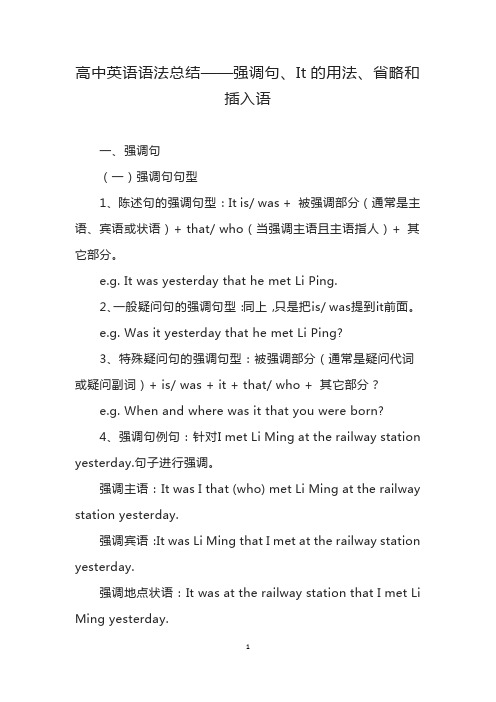
高中英语语法总结——强调句、It的用法、省略和插入语一、强调句(一)强调句句型1、陈述句的强调句型:It is/ was + 被强调部分(通常是主语、宾语或状语)+ that/ who(当强调主语且主语指人)+ 其它部分。
e.g. It was yesterday that he met Li Ping.2、一般疑问句的强调句型:同上,只是把is/ was提到it前面。
e.g. Was it yesterday that he met Li Ping?3、特殊疑问句的强调句型:被强调部分(通常是疑问代词或疑问副词)+ is/ was + it + that/ who + 其它部分?e.g. When and where was it that you were born?4、强调句例句:针对I met Li Ming at the railway station yesterday.句子进行强调。
强调主语:It was I that (who) met Li Ming at the railway station yesterday.强调宾语:It was Li Ming that I met at the railway station yesterday.强调地点状语:It was at the railway station that I met Li Ming yesterday.强调时间状语:It was yesterday that I met Li Ming at the railway station.5、注意:构成强调句的it本身没有词义;强调句中的连接词一般只用that, who,即使在强调时间状语和地点状语时也如此,that, who不可省略;强调句中的时态只用两种,一般现在时和一般过去时。
原句谓语动词是一般过去时、过去完成时和过去进行时,用It was …,其余的时态用It is …。
高中英语常用重点句型总结(145条)

高中英语常用重点句型总结(145条)1.So+be/have等助动词/情态动词+主语“某人情况也是如此:He has been to Britain. So have I.他曾去过英国。
我也去过。
I went swimming yesterday afternoon. So did my sister.昨天下午我去游泳了。
我妹妹也去了。
2.What about/How about+名词/代词/doing sth,/副词/状语从句“………该怎么办?……做什么?”(用来征求对方意见或询问消息、提出建议等)What/How about going to France this summer?夏天到法国去度假怎么样?What/How about a walk in the woods?到林间散散步怎么样?3.……do as sb. does……“照某人那样去做”如:You should do as the teacher tells you to .你应该照你老师讲的那样去做。
When in Rome do as the Romans do.入乡随俗。
4.None of+名词/代词+do/does……“在……中没有任何一个做……”如:None of the telephones can work。
所有的电话都不能工作了。
None of them are/is interested in physics.他们中没有一个人对物理感兴趣。
5.Not+all+复数名词/不可数名词+are/is……“并非全部……”;“并不是所有的……”如:Not all the parts of the car will be made in the factory.并不是所有的汽车部件都在这家工厂制造。
Not all the students can pass the exam.并非所有的同学都能通过考试。
Not all factories here produce shirts.这儿的工厂不都生产衬衣。
高一英语语法点归纳大全

高一英语语法点归纳大全一、时态一般现在时用法表示经常性或习惯性的动作或存在的状态。
例如:I get up at 6:30 every day.(我每天六点半起床。
)表示客观事实、普遍真理等。
The earth moves around the sun.(地球绕着太阳转。
)构成:主语+ 动词原形(当主语为第三人称单数时,动词需加s 或es)一般过去时用法:表示过去某个时间发生的动作或存在的状态。
I visited my grandparents last weekend.(我上周末去看望了我的祖父母。
)构成:主语+ 动词的过去式一般将来时用法:表示将来要发生的动作或存在的状态。
will + 动词原形:I will go to the park tomorrow.(我明天将去公园。
)be going to + 动词原形:He is going to study abroad next year.(他明年打算出国留学。
)现在进行时用法:表示现在正在进行的动作。
She is reading a book now.(她现在正在读书。
)构成:主语+ am/is/are + 动词的现在分词过去进行时用法:表示过去某一时刻或某一段时间正在进行的动作。
I was watching TV at 8 o'clock last night.(昨晚八点我正在看电视。
)构成:主语+ was/were + 动词的现在分词二、语态主动语态:句子的主语是动作的执行者。
例如:The cat catches the mouse.(猫抓老鼠。
)被动语态构成:be + 及物动词的过去分词一般现在时的被动语态:am/is/are + 过去分词。
The book is read by many people.(这本书被很多人阅读。
)一般过去时的被动语态:was/were + 过去分词。
The house was built in 1990.(这座房子建于1990 年。
高中英语:特殊句式语法总结

高中英语:特殊句式语法总结用来表示说话人强烈的喜、怒、哀、乐等感情的句子,叫感叹句。
感叹句由what 或how引导,具体用法如下表:感叹句记忆口诀:感叹句,并不难,what与how应在前。
形容词、副词跟着how,what后面名词连。
名词若是可数单,前带冠词a或an。
主词、谓语放后面,省略它们也常见。
祈使句的基本用法祈使句是用来表示命令、请求、建议或劝告等的句子。
常省略主语,谓语动词用原形。
1. 肯定的祈使句①句型:动词原形+其他成分。
Be careful!小心!②"Do+祈使句"表示一种强烈的感情或请求,do起强调作用。
③please用在祈使句中可以表示一种客气的语气,但please用在句末时,必须用逗号与其余部分隔开。
Close the door, please. 请关门。
2. 否定的祈使句①常用句型:Don’t+动词原形+其他成分。
Don’t be late for school again! 别再迟到了!②用Never开头:Never+动词原形+其他成分。
Never leave today’s work for tomorrow! 不要把今天的工作留到明天!3. Let引导的祈使句以Let开头的句子也是祈使句,表示陈述和建议。
其否定形式有两种:Let...not 或Don’t...Let us not be late. 让我们不要迟到。
Don’t let the boy play football in the street. 不要让这个男孩在街上踢足球。
祈使句与简单句、复合句之间的转换1. "Let’s + 动词原形 + 其他"可转换为"Shall we + 动词原形 + 其他? "。
Let’s go fishing thi s afternoon. =Shall we go fishing this afternoon?2. "祈使句 + and/or + 简单句"可转换为含if引导的条件状语从句的复合句。
北师大版高中英语语法总结

北师大版高中英语语法总结(必修一—选修八)必修一一、present simple and present continuous 一般现在是和现在进行时1,present simple: 反复进行的,经常性的动作(惯例习惯)Eg, He watches soap operas.及状态I live in Budapest.一般现在时常和下列时间状语连用:always, usually, from, time to time, twice a week, rarely, seldom, once a month, never.2,现在进行时:说话时正在进行的动作(现在,此刻)一定时间段内经常进行的动作和现在进行时连用的时间状语有just, now, at the moment, at present.二、future:arrangements and intentions 将来的安排和打算1、be going to 表示打算要做的事情。
2、现在进行时表示已经确定或安排好事情。
Eg, I‘m getting married in June.3、一般现在是表示不可改变的官方活动或时间表The summer term begins on the 15th of February.三、past simple and past continues1,psat simple :一般过去时,表示过去完成的动作或过去的情境和习惯。
Eg: She climb the stairs and went to her room.用一般过去时要在规则动词词尾加-ed,或用不规则动词的过去式,一般过去式的疑问句和否定句用did 和didn‘t 加动词原形。
2、past continuous过去进行时:过去某段时间正在进行的动作形成某些事件发生的情境动作。
Eg, It was raining during the whole match.当过去进行时和一般过去时出现在同一个句子中时,过去进行时描述故事发生的背景,儿一般过去时则报道该事件。
英语中的固定搭配和习惯用法总结

英语中的固定搭配和习惯用法总结
1.固定搭配(ms and ns)
固定搭配是指在英语中频繁使用的一些固定组合的词汇,其意义往往不能从单个单词的意思推测出来。
以下是一些常见的英语固定搭配:
to kick the ___:去世
to break the ice:打破僵局
___:泄露秘密
to hit the nail on the head:一针见血
___:开夜车
2.惯用法(matic Usage)
惯用法是指在英语中惯常使用的表达方式,它们的用法可能有些特殊,需要掌握固定的词序或句型。
以下是一些常见的英语惯用法:
to make a difference:产生影响
to take a back seat:退居次要地位
to give ___:帮助某人
to keep an eye on:密切关注
to play it by ear:随机应变
3.练建议(Practice Tips)
要提高对固定搭配和惯用法的掌握,可以采取以下方法:
阅读英语文章和书籍,特别关注其中常用的固定搭配和惯用法;
练使用固定搭配和惯用法来表达自己的想法,写作时尽量使用
这些表达方式;
参加英语口语角或者与他人进行英语对话时,积极运用这些固
定搭配和惯用法。
希望以上总结对您研究和使用英语中的固定搭配和惯用法有所
帮助!。
英语复习常用动词习惯用法

英语复习常用动词习惯用法常用动词习惯用法大家有知道的吗?如果没有,可以看小编总结的哦!接下来,小编给大家准备了英语复习常用动词习惯用法,欢迎大家参考与借鉴。
英语复习常用动词习惯用法常用动词习惯用法 1. allow1 sb to do sth 允许某人去做某事(后接动词不定式)My father allowed3 me to go out for a walk after finishing my homework.2. asked sb (not) to do sth 叫某人做事某事(叫某人不要去做某事)My father asked me to study hard.He asked me not to swim alone4.be asked to do sth 被叫去做某事/被邀请去做某事I was5 asked to have a dinner with them yesterday.3. be afraid to do sth 害怕做某事She is afraid to ask me questions.4. be afaid of doing sth 害怕做某事I am afraid of going6 out at night.5. be afaid of sth 害怕某物He is afraid of snakes.6. be amazed7 to do sth 对做某事感到惊讶He was amazed to meet the girl there.be amazed at sth 对某事感到惊讶they were amazed at the news8.7. be busy doing/with sth 忙于做某事(常考)e2.g: I was busy washing9 my car at that time. 那时候我正忙于清洗我的车子。
I am busy with my work.8. be coming/going/leaving/fiying/moving/dying10(某些位移动词用进行时态时表将来)the bus is coming/the dog is dying.9. be excited11 to do sth 对做……感到兴奋Jacky was excited to travel12 there by plane.be excited at sthLily13 was excited at his words.be excited about doing sthhe was excited about passing the exam14 without going overing books.10. be frightened15 to do sth 害怕去做某事Sam is frightened to ride a horse.11. be glad/happy to do sth 高兴去做某事she is happy to clean the blackboard with me.be pleased16 to do sth高兴做某事she was pleased to help the old man yesterday.be pleased with sth 对某事感到高兴/满意the teacher was pleased with my answer.12. be interested17 in sth/doing sth 对某事感兴趣/对做某事感兴趣she is interested in swimming in the river.My btother is interested in Chinese.13. be/get ready for/to do sthBe ready for sth 为某事做好了准备We are ready for the exam.Be ready to do sth 为做某事做好了准备We are ready to have a birthday party for her.get ready for sth为某事在做准备We are getting ready for the exam.get ready for sth 为做某事而做准备13. be sorry to do sth 对做某事感到抱歉14. be surprised18 to do sth 对做某事感到惊奇be surprised at sth 对某事感到惊奇15. be worth19 doing sth 值得做某事(worth 后接动词-ing形式,常考)16. begin to do sthbegin/start to do/doing sth ( 开始去做某事 )17. can/be able20 to afford21 (to buy) sth 有能力购买(供)……18. can/may/must do sth could/would22/should/might do sth19. can’t wait to do sth 迫不急待地去做某事20. decide23 to do sth 决定去做某事make up one’s mind24 to do sth 下决心去做某事(常考)make a decision25 to do sth 对做某事作出决定21. deserve26 to do sth 值得/应该做……22. encourage27 sb to do sth 鼓励某人去做某事23. enjoy doing sth 乐意去做某事24. expect28 (sb) to do sth 期望去做某事25. fail29 to do sth 做某事失败succeed30 doing sth 成功做了某事26. finish doing sth 做完某事(后接动词-ing形式)(常考)27. follow sb to do sth 跟随某人去做某事28. get sb to do sthmake sb do sthlet sb do sth (让某人做某事(后接动词原形))29. get/have a chance31 to do sth 得到一个做某事的机会30. give/pass/show/lend/sell sb sth/sth to sbbuy/get/bring sb sth/sth for sb31. go on to do sth 继续做事(常考)go on doing sth 继续做事(常考)32. hate32 to do/doing sth 讨厌/不喜欢做某事33. have fun doing sth34. have problems33 doing sth 做某事遇到困难35. have sb do sthhave sth donehave sth to do 工有事要做36. hear sb do sth 听到某人做某事(后接动词原形,常考)hear sb doing sth 听到某人正在做某事(常见)37. help to do sth 帮忙做某事help sb (to) do sth 帮助某人做某事38. hope/wish to do sth 希望做某事wish sb to do sth 希望某人做某事39. I t seems35 that 这像是……(后接从句)seem34 to do sthseem +adj40. It’s + adj+(for sb) to do sth .It’s+adj +(of sb) to do sthe.g: It’s glad for him to hear the news.41. It takes sb some time/money to do sth . 花费某人多长时间做某事(常考)42. pay36 …for… cost37 spend…on….. it take …to do sth43. It’s best for sb to do sth. 对某人来说做某事是最好的had38 better do sth 最好做某事(注意had没有时态和人称的变化,better后接动词原形)44. It’s time for sb to do sth 是某人做某事的时候了45. keep (on)doing sth 坚持做某事(常考)keep sb doing sth 让某人做某事(常考)keep sb from doing sth 阻止某人做某事(常考)keep sb/sth +adjkeep the book for 2 days 借这本书两天(不要用borrow或lend)46. learn to do sth 学做某事learn sth from sb 向某人学习47. like to do/doing sth 喜欢做某事like sb to do sth 喜欢某人做某事48. need to do sthneed doing sth/to be doneneed sth needn’t do sth(需要做某事)49. prefer39 to do sth rather40 than do sth 宁愿……而不愿……(常考)prefer doing sth to doing sth 喜欢做……胜过做……e.g: I prefer reading41 books to going shopping. 比起购物来,我更爱读书。
高中英语语法总结句式归纳
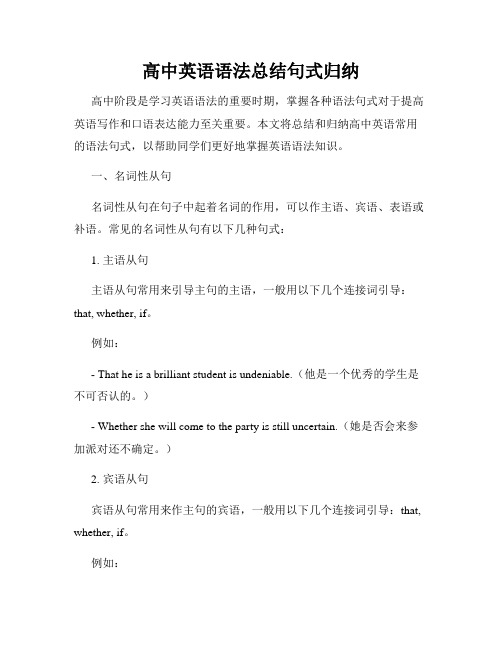
高中英语语法总结句式归纳高中阶段是学习英语语法的重要时期,掌握各种语法句式对于提高英语写作和口语表达能力至关重要。
本文将总结和归纳高中英语常用的语法句式,以帮助同学们更好地掌握英语语法知识。
一、名词性从句名词性从句在句子中起着名词的作用,可以作主语、宾语、表语或补语。
常见的名词性从句有以下几种句式:1. 主语从句主语从句常用来引导主句的主语,一般用以下几个连接词引导:that, whether, if。
例如:- That he is a brilliant student is undeniable.(他是一个优秀的学生是不可否认的。
)- Whether she will come to the party is still uncertain.(她是否会来参加派对还不确定。
)2. 宾语从句宾语从句常用来作主句的宾语,一般用以下几个连接词引导:that, whether, if。
例如:- I don't know if she can finish the task in time.(我不知道她是否能按时完成任务。
)- He asked me whether I had seen the movie.(他问我是否看过那部电影。
)3. 表语从句表语从句常用来作主句的表语,一般用以下几个连接词引导:that, whether。
例如:- My biggest concern is that we won't have enough time.(我最担心的是我们没有足够的时间。
)- The question is whether they will come to the meeting.(问题是他们是否会来开会。
)4. 同位语从句同位语从句用来解释或说明名词的内容,常用连接词that。
例如:- The fact that he won the competition surprised everyone.(他赢得比赛的事实让大家都感到惊讶。
高中英语知识点总结归纳

高中英语知识点总结归纳一、语法知识点1. 时态- 一般现在时- 用法:表示经常发生的动作、存在的状态或客观事实、真理等。
例如:The earth moves around the sun.(客观真理)He often goes to school by bike.(经常发生的动作)- 结构:主语 + 动词原形(第三人称单数形式为动词 + s / es)。
例如:I play football every day. She studies hard.- 一般过去时- 用法:表示过去某个时间发生的动作或存在的状态。
例如:I saw him yesterday.- 结构:主语 + 动词的过去式。
规则动词的过去式变化有一定规律,如直接加 -ed(work - worked),以e结尾加 -d(live - lived)等;不规则动词需要单独记忆(如go - went,see - saw)。
- 一般将来时- 用法:表示将来某个时间要发生的动作或存在的状态。
例如:I will go to Beijing next week.- 结构:will + 动词原形或be going to + 动词原形。
be going to结构更强调计划、打算。
例如:He is going to study abroad.- 现在进行时- 用法:表示此时此刻正在进行的动作,也可表示现阶段正在进行的动作。
例如:Look! She is dancing.(此时此刻)He is writing a book these days.(现阶段)- 结构:主语 + be动词(am/is/are)+ 动词的 -ing形式。
- 过去进行时- 用法:表示过去某个时刻或某段时间正在进行的动作。
例如:At that time, I was reading a book.- 结构:主语 + was / were + 动词的 -ing形式。
- 现在完成时- 用法:表示过去发生的动作对现在造成的影响或结果,或表示从过去开始一直持续到现在的动作或状态。
高中英语常见句型结构总结
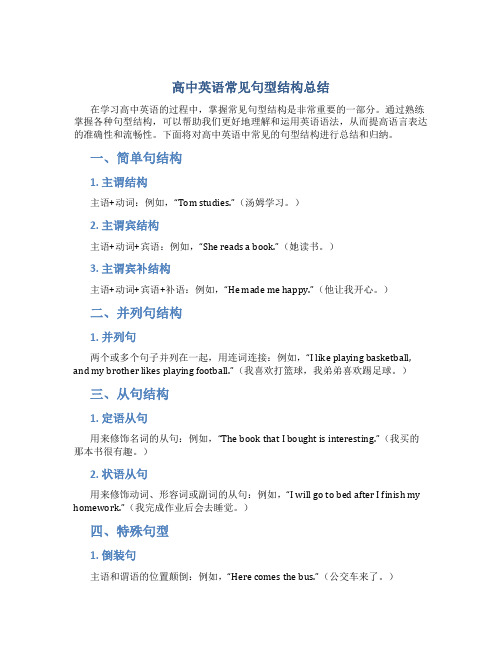
高中英语常见句型结构总结在学习高中英语的过程中,掌握常见句型结构是非常重要的一部分。
通过熟练掌握各种句型结构,可以帮助我们更好地理解和运用英语语法,从而提高语言表达的准确性和流畅性。
下面将对高中英语中常见的句型结构进行总结和归纳。
一、简单句结构1. 主谓结构主语+动词:例如,“Tom studies.”(汤姆学习。
)2. 主谓宾结构主语+动词+宾语:例如,“She reads a book.”(她读书。
)3. 主谓宾补结构主语+动词+宾语+补语:例如,“He made me happy.”(他让我开心。
)二、并列句结构1. 并列句两个或多个句子并列在一起,用连词连接:例如,“I like playing basketball, and my brother likes playing football.”(我喜欢打篮球,我弟弟喜欢踢足球。
)三、从句结构1. 定语从句用来修饰名词的从句:例如,“The book that I bought is interesting.”(我买的那本书很有趣。
)2. 状语从句用来修饰动词、形容词或副词的从句:例如,“I will go to b ed after I finish my homework.”(我完成作业后会去睡觉。
)四、特殊句型1. 倒装句主语和谓语的位置颠倒:例如,“Here comes the bus.”(公交车来了。
)2. 强调句强调句型的构造:例如,“It is Tom who won the game.”(赢得比赛的是汤姆。
)在学习英语句型结构时,要注意识别各种句型的特点,并结合实际情况进行灵活运用。
通过不断的练习和积累,我们可以逐渐提高对句型结构的把握能力,从而更好地运用英语进行交流和表达。
以上是高中英语常见句型结构的总结,希望对大家的学习有所帮助。
让我们一起努力,提升英语水平!。
英语复习常用动词习惯用法

英语复习常用动词习惯用法常用动词习惯用法大家有知道的吗?如果没有,可以看小编总结的哦!接下来,小编给大家准备了英语复习常用动词习惯用法,欢迎大家参考与借鉴。
英语复习常用动词习惯用法常用动词习惯用法1. allow1 sb to do sth 允许某人去做某事(后接动词不定式)My father allowed3 me to go out for a walk after finishing my homework.2. asked sb (not) to do sth 叫某人做事某事(叫某人不要去做某事)My father asked me to study hard.He asked me not to swim alone4.be asked to do sth 被叫去做某事/被邀请去做某事I was5 asked to have a dinner with them yesterday.3. be afraid to do sth 害怕做某事She is afraid to ask me questions.4. be afaid of doing sth 害怕做某事I am afraid of going6 out at night.5. be afaid of sth 害怕某物He is afraid of snakes.6. be amazed7 to do sth 对做某事感到惊讶He was amazed to meet the girl there.be amazed at sth 对某事感到惊讶they were amazed at the news8.7. be busy doing/with sth 忙于做某事(常考)e2.g: I was busy washing9 my car at that time. 那时候我正忙于清洗我的车子。
I am busy with my work.8. be coming/going/leaving/fiying/moving/dying10(某些位移动词用进行时态时表将来)the bus is coming/the dog is dying.9. be excited11 to do sth 对做感到兴奋Jacky was excited to travel12 there by plane.be excited at sthLily13 was excited at his words.be excited about doing sthhe was excited about passing the exam14 without going overing books.10. be frightened15 to do sth 害怕去做某事Sam is frightened to ride a horse.11. be glad/happy to do sth 高兴去做某事she is happy to clean the blackboard with me.be pleased16 to do sth高兴做某事she was pleased to help the old man yesterday.be pleased with sth 对某事感到高兴/满意the teacher was pleased with my answer.12. be interested17 in sth/doing sth 对某事感兴趣/对做某事感兴趣she is interested in swimming in the river.My btother is interested in Chinese.13. be/get ready for/to do sthBe ready for sth 为某事做好了准备We are ready for the exam.Be ready to do sth 为做某事做好了准备We are ready to have a birthday party for her.get ready for sth为某事在做准备We are getting ready for the exam.get ready for sth 为做某事而做准备13. be sorry to do sth 对做某事感到抱歉14. be surprised18 to do sth 对做某事感到惊奇be surprised at sth 对某事感到惊奇15. be worth19 doing sth 值得做某事(worth 后接动词-ing 形式,常考)16. begin to do sthbegin/start to do/doing sth ( 开始去做某事)17. can/be able20 to afford21 (to buy) sth 有能力购买(供)18. can/may/must do sth could/would22/should/might do sth19. cant wait to do sth 迫不急待地去做某事20. decide23 to do sth 决定去做某事make up ones mind24 to do sth 下决心去做某事(常考)make a decision25 to do sth 对做某事作出决定21. deserve26 to do sth 值得/应该做22. encourage27 sb to do sth 鼓励某人去做某事23. enjoy doing sth 乐意去做某事24. expect28 (sb) to do sth 期望去做某事25. fail29 to do sth 做某事失败succeed30 doing sth 成功做了某事26. finish doing sth 做完某事(后接动词-ing形式)(常考)27. follow sb to do sth 跟随某人去做某事28. get sb to do sthmake sb do sthlet sb do sth (让某人做某事(后接动词原形))29. get/have a chance31 to do sth 得到一个做某事的机会30. give/pass/show/lend/sell sb sth/sth to sbbuy/get/bring sb sth/sth for sb31. go on to do sth 继续做事(常考)go on doing sth 继续做事(常考)32. hate32 to do/doing sth 讨厌/不喜欢做某事33. have fun doing sth34. have problems33 doing sth 做某事遇到困难35. have sb do sthhave sth donehave sth to do 工有事要做36. hear sb do sth 听到某人做某事(后接动词原形,常考)hear sb doing sth 听到某人正在做某事(常见)37. help to do sth 帮忙做某事help sb (to) do sth 帮助某人做某事38. hope/wish to do sth 希望做某事wish sb to do sth 希望某人做某事39. I t seems35 that 这像是(后接从句)seem34 to do sthseem +adj40. Its + adj+(for sb) to do sth .Its+adj +(of sb) to do sthe.g: Its glad for him to hear the news.41. It takes sb some time/money to do sth . 花费某人多长时间做某事(常考)42. pay36 for cost37 spendon.. it take to do sth43. Its best for sb to do sth. 对某人来说做某事是最好的had38 better do sth 最好做某事(注意had没有时态和人称的变化,better后接动词原形)44. Its time for sb to do sth 是某人做某事的时候了45. keep (on)doing sth 坚持做某事(常考)keep sb doing sth 让某人做某事(常考)keep sb from doing sth 阻止某人做某事(常考)keep sb/sth +adjkeep the book for 2 days 借这本书两天(不要用borrow或lend)46. learn to do sth 学做某事learn sth from sb 向某人学习47. like to do/doing sth 喜欢做某事like sb to do sth 喜欢某人做某事48. need to do sthneed doing sth/to be doneneed sth neednt do sth(需要做某事)49. prefer39 to do sth rather40 than do sth 宁愿而不愿(常考)prefer doing sth to doing sth 喜欢做胜过做e.g: I prefer reading41 books to going shopping. 比起购物来,我更爱读书。
高中英语句型总结大全及答案
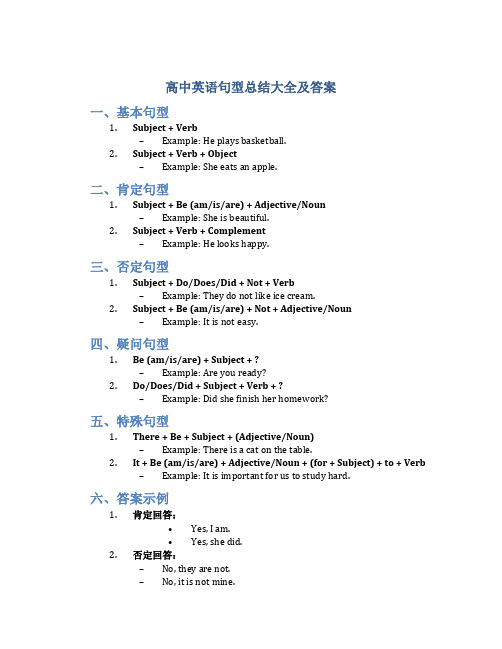
高中英语句型总结大全及答案一、基本句型1.Subject + Verb–Example: He plays basketball.2.Subject + Verb + Object–Example: She eats an apple.二、肯定句型1.Subject + Be (am/is/are) + Adjective/Noun–Example: She is beautiful.2.Subject + Verb + Complement–Example: He looks happy.三、否定句型1.Subject + Do/Does/Did + Not + Verb–Example: They do not like ice cream.2.Subject + Be (am/is/are) + Not + Adjective/Noun–Example: It is not easy.四、疑问句型1.Be (am/is/are) + Subject + ?–Example: Are you ready?2.Do/Does/Did + Subject + Verb + ?–Example: Did she finish her homework?五、特殊句型1.There + Be + Subject + (Adjective/Noun)–Example: There is a cat on the table.2.It + Be (am/is/are) + Adjective/Noun + (for + Subject) + to + Verb–Example: It is important for us to study hard.六、答案示例1.肯定回答:•Yes, I am.•Yes, she did.2.否定回答:–No, they are not.–No, it is not mine.结语以上是高中英语句型总结大全及答案的内容,希望对您有所帮助并提升英语表达能力。
高中英语语法难点归纳总结大全

高中英语语法难点归纳总结大全高中英语语法是英语学习过程中的一大难点,对于许多学生来说是一座难以逾越的高山。
为了帮助学生更好地掌握高中英语语法,本文将对高中英语语法难点进行归纳和总结,提供一份完整的高中英语语法难点大全供学生参考。
一、时态的使用1. 一般现在时:用于叙述客观事实、习惯性动作和普遍真理。
例如:The sun rises in the east.2. 一般过去时:用于叙述过去发生的事情或存在的状态。
例如:I studied English yesterday.3. 一般将来时:用于表示将来发生的动作或存在的状态。
例如:I will go to the party tomorrow.二、非谓语动词的用法1. 动名词:用于作主语、宾语、表语、定语和状语等。
例如:Swimming is my favorite sport.2. 不定式:用于表示动作的目的、结果、原因等。
例如:I want to learn how to play the guitar.3. 分词:用于形容词性、副词性或独立主格等。
例如:The broken window needs to be fixed.三、从句的结构与引导词1. 定义从句:用于对主句进行解释、说明。
例如:The book that you gave me is very interesting.2. 时间状语从句:用于表示时间的先后。
例如:I will call you when I arrive home.3. 条件状语从句:用于表示条件。
例如:If it rains tomorrow, we will stay at home.四、虚拟语气的用法1. 虚拟条件句:表示与事实相反的假设或愿望。
例如:If I were you, I would study harder.2. 虚拟假设句:表示与事实相反的假设或推测。
例如:He speaks English as if he were a native speaker.五、名词性从句的用法1. 主语从句:用作句子的主语。
高中英语习惯用法汇总
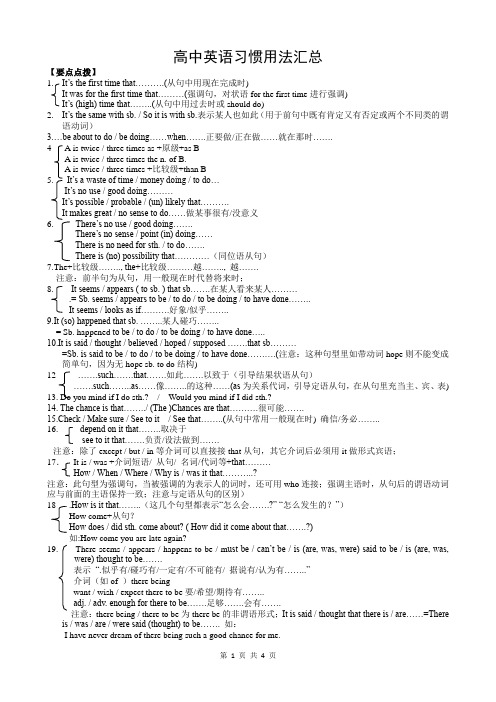
高中英语习惯用法汇总【要点点拨】1.It’s the first time that……….(从句中用现在完成时)It was for the first time that………(强调句,对状语for the first time进行强调)It’s (high) time that……..(从句中用过去时或should do)2.It’s the same with sb. / So it is with sb.表示某人也如此(用于前句中既有肯定又有否定或两个不同类的谓语动词)3.…be about to do / be doing……when…….正要做/正在做……就在那时…….4 A is twice / three times as +原级+as BA is twice / three times the n. of B.A is twice / three times +比较级+than B5. It’s a waste of time / money doing / to do…It’s no use / good doing………It’s possible / probable / (un) likely that……….It makes great / no sense to do……做某事很有/没意义6. There’s no use / good doing…….There’s no sense / point (in) doing……There is no need for sth. / to do…….There is (no) possibility that…………(同位语从句)7.The+比较级…….., the+比较级………越…….., 越…….注意:前半句为从句,用一般现在时代替将来时;8. It seems / appears ( to sb. ) that sb…….在某人看来某人……….= Sb. seems / appears to be / to do / to be doing / to have done……..It seems / looks as if……….好象/似乎……..9.It (so) happened that sb. ……..某人碰巧……..= Sb. happened to be / to do / to be doing / to have done…..10.It is said / thought / believed / hoped / supposed …….that sb………=Sb. is said to be / to do / to be doing / to have done……….(注意:这种句型里如带动词hope则不能变成简单句,因为无hope sb. to do结构)12 …….such…….that…….如此…….以致于(引导结果状语从句)…….such……..as……像……..的这种……(as为关系代词,引导定语从句,在从句里充当主、宾、表)13. Do you mind if I do sth.? / Would you mind if I did sth.?14. The chance is that……../ (The )Chances are that……….很可能…….15.Check / Make sure / See to it / See that……..(从句中常用一般现在时) 确信/务必……..16. depend on it that……..取决于see to it that…….负责/设法做到…….注意:除了except / but / in等介词可以直接接that从句,其它介词后必须用it做形式宾语;17.It is / was +介词短语/ 从句/ 名词/代词等+that………How / When / Where / Why is / was it that………..?注意:此句型为强调句,当被强调的为表示人的词时,还可用who连接;强调主语时,从句后的谓语动词应与前面的主语保持一致;注意与定语从句的区别)18 .How is it that……..(这几个句型都表示“怎么会…….?” “怎么发生的?”)How come+从句?How does / did sth. come about? ( How did it come about that…….?)如:How come you are late again?19. There seems / appears / happens to be / m ust be / can’t be / is (are, was, were) said to be / is (are, was,were) thought to be…….表示“.似乎有/碰巧有/一定有/不可能有/ 据说有/认为有……..”介词(如of )there beingwant / wish / expect there to be要/希望/期待有……..adj. / adv. enough for there to be…….足够…….会有…….注意:there being / there to be为there be的非谓语形式;It is said / thought that there is / are……=There is / was / are / were said (thought) to be……. 如:I have never dream of there being such a good chance for me.It won’t be cold enough for there to be a frost toni ght.20. 疑问词+插入语+陈述语序?Who do you think he’ll have attend the meeting?21. But for + n. / pron., sb. / sth. would (not) have done…..要不是……., 某人早就……(表示虚拟语气)=If it had not been for…..,……./ If there had not been ……., ……..22. It won(’t) be long be fore +从句(从句中用一般现在时)不久/很久就要…….It was (not) long before+从句(从句中用一般过去时)不久/很久才……..23. Those who………….(从句及主句中谓语动词用复数形式).Anyone who…………= Whoever………..(从句及主句中谓语动词用单数形式)24…….主句(一般现在时或过去时)…...when从句….(might / should do 或might / should have done) 表示”对比”,意思为“本该……(可)而却”,主句中为陈述语气,从句里为虚拟语气,如:Why are you here when you should be in school?你本该上学的怎么在这儿?He stopped trying when he might have succeeded .本该已成功了他却停止努力了.25. There is ./ Sb. have no doubt that………(同位语从句,that不可省略)There is / Sb. have some doubt whether……..(同位语从句不可用if)Sb. doubt if / whether…….Sb. don’t doubt that………26 . immediately / directly / instantly / the moment +从句on / upon + n. / doingNo sooner had sb. done than …….(过去时)Hardly had sb. done when……..(过去时)注意:这几个结构都表示“一…….就”;27. every time / each time / the last time / the first time / next time +从句(名词性短语引导一个时间状语句)anywhere / everywhere +从句(相当于wherever引导的地点状语从句)You can go anywhere you like.Next time you come, please bring your son along.28.If only / I wish +从句(用过去类时态) 表示虚拟语气, “要是…….就好了” “但愿……就好了!”29 .Considering + n. 或pron. 或that从句/ Seeing that……….考虑到/鉴于…….Given + n. / pron作状语,表示“在有……的情况下” “如果有” “假定”,有时也表示”考虑到”Seeing (that) he refused to help us, there is no reason why we should help him now.Given good health, I hope to finish the work this year.Given their inexperience / that they are inexperienced, they’ve done a good job.30.There was a time when…….曾经有那么一度……….31.other than与no, not, none等否定词连用,表示肯定意思,如:It was none other than Mr. Smith.这正是Smith先生.32. Not until…….did / do/ does / will sb. do……It was / is not until ……that sb………33.It’s (un) like sb. to do / to have done……做某事很像某人/ 做某事可不像某人34.It remains to be seen Wh--words ……..是否…….还有待于看.(不用that, if作连接词)35.It only remains for sb. to do……剩下的只是要某人做某事.We’ve got every thing ready. It only remains for you to come to dinner.36.One moment……., and now………刚才一会儿还在做……而现在却……..37.Not all / both / everyone………表示部分否定38. Such is / are……..这(些)就是…….(谓语动词单复数由后面名词决定)39. I’d rather (not) do / have done……我宁愿…..I’d rather +从句(从句中用过去时或过去完成时)40. It’s important / necessary / strange / surprising….+that……(用陈述语气或should do)41. I like / hate / appreciate it that / when等从句(it表示后面从句的这种情况)I appreciate it if you will give me a hand.42. By the time +从句(一般现在时/过去时),主句(将来完成时/过去完成时)43………., as is often the case with sb. / as is usual with sb.(as引导非限制性定语从句)44 in case / lest / for fear that…….(从句中用陈述语气或should do)45.While置于句首可表示As long as 或AlthoughWhile there is life there is hope.While I admit his good points, I can see his bad ones.46. can not ( never) ……too +adj. (adv. ) / adj. (adv.) + enough “越……越好”“非常”too + adj. ( anxious / eager / willing / ready / glad等)+to do….表示肯定意思I can’t thank you enough.我非常感激你.He was too glad to see his father.=He was very glad to see his father.47. not / neve等表示否定的词与比较级连用表示最高级,如:-----Do you agree with his suggestion? -------I can’t agree more.48. What if……..要是…….怎么办?What if he doesn’t come tomorrow?49. more……..than与其…….不如……..He is more nervous than frightened.50. It is / has been +一段时间+since从句(从句中如为延续性动词,则实际表示的意思相反)It is two years since he drank.他不喝酒已两年了.【各个击破】1.Mr. Smith didn’t understand ______ made his son so upset this morning.A. what was itB. why it was thisC. how that wasD. what it was that2.-----Did you have a good sleep last night?----Yes, never sleep _______.A. badlyB. betterC. worseD. best3.We are only _____ glad to do anything we can _______ her.A.too; to helpB. very; help C too; help D. very; helping4.-----How come you are late for class again?-------_____________.A. Because I missed the busB. By bus and then on footC. Please excuse meD. It’s quite wrong5._______more than 3,000 languages in the world.A. There are thought to beB. There is thought to beC. They are thought to beD. It is thought to be6.-----George is a wise person.-----But in my opinion, he is ______ than wise.A. clevererB. braverC. more braveD. less brave7.-----So can I ask you a few fairly straightforward questions about yourself?-----No problem. I like ________ when people are open and direct.A. thatB. thisC. itD. them8.----______I move the picture over here?----I suppose it’ll look better.A. How ifB. What aboutC. How aboutD. What if9.China has produced ______ this year as it did in 2002.A. as twice much steelB. twice steel as muchC. twice as much steelD. as much steel twice10.-----_______was it ______ you discovered the secret of his?------Totally by chance.A. How; whenB. What; thatC. What; whenD. How; that11.-----Who on earth could it be?------It was _______ other than Clint Eastwood.A. noneB. nothingC. notD. nobody12._____his age, he did it quite well, so don’t ______ him any more.A Given; blame B. Considered; say C. To regard; scold D. Considering; speak13.No sooner _____ themselves in their seats in the theatre ______ the curtain went up.A. they have settled; beforeB. had they settled; thanC. have they settled; whenD. they had settled; than14. -----Did you meet with the famous space hero, Yang Liwei?------______I had come here earlier!A. If onlyB. If notC. But forD. For fear15.The students expected __________ more reviewing classes before the final exams.A. it would beB. there beingC. it to beD. there to be16.Students shouldn’t be given so difficult a problem _____ they can not work out.A. thatB. whichC. whileD. as17. It was twelve o’clock at midnight _______ they arrived at a lonely village.A. thatB. beforeC. sinceD. when18.-----The exam wasn’t difficult, was it?------No, but I don’t think ______could pass it.A. somebodyB. anybodyC. everybodyD. nobody19.-----I always take care when doing papers on the computer.-----You meant it! One can not be _______careful working on it.A. tooB. veryC. soD. quite20.-----Is Miss White working these days?------No. It is two months since she worked here.------Oh,_____________?A. where is she working nowB. would you please show me the wayC. which is her officeD. is she ill。
高一英语背诵材料

精心整理高一英语背诵材料练案Thursday,April07,2016Practicemakesperfect.熟能生巧。
高中英语88个句型和习惯用法总结1.Accordingto...依照/根据……。
Accordingtothenewspaper,it’sagreatmovie.据报纸说,这是一部很棒的电影。
Frommypointofview,在我看来,……Frommypointofview,CrazyEnglishisthemosteffectivewaytolearnEnglish.FromwhereIstand,…从我的立场来说,……。
FromwhereIstand,weshouldsupporthimnomatterwhathappens.依我看无论发生什么事我们都应该支持他。
Inmyopinion/Inmyview,…我认为……。
Inmyopinion,weshouldneverabandonhopeforsuccess.我认为我们永远都不应该放弃对成功的希望。
问型家。
清楚Wha法。
的是。
是脱可信的间。
Betterlatethannever.迟做总比不做好。
9.Foronething,Foranother,一方面……;另一方面。
Foronething,theseshoesdon’tsuityou.Foranother,theyaretooexpe nsive.一方面,这双鞋子并不适合你;另一方面,这太贵了。
10.Hardly…when…/Nosooner…than…/scarcely…when一……就……。
[倒装句型]Hardlyhadshebegunspeakingwhentherewasaknockonthedoor.她刚开始说话就听到敲门声。
Nosoonerhadheclosedhiseyesthanhefellasleep.他一合眼就睡着了。
11.I’mgrateful/thankfulfor…我对……特别感激。
- 1、下载文档前请自行甄别文档内容的完整性,平台不提供额外的编辑、内容补充、找答案等附加服务。
- 2、"仅部分预览"的文档,不可在线预览部分如存在完整性等问题,可反馈申请退款(可完整预览的文档不适用该条件!)。
- 3、如文档侵犯您的权益,请联系客服反馈,我们会尽快为您处理(人工客服工作时间:9:00-18:30)。
高中句型习惯用法总结1.According to…依照、根据According to the newspaper, it’s a great movie.根据报纸说,这是一部很棒的电影。
2.As a matter of fact,/ In fact,/ In reality…实际上…..,……As a matter of fact,/In fact,/ In reality, I don’t agree with you.实际上,我不大同意你的看法。
3.As far as I’m concerned…就我而言,……As far as I’m concerned, I think we should pay more attention to the safety of school children.就我而言,我以为我们应该更关注在校儿童的安全问题。
4.As far as I know,…据我所知As far as I know, he is not coming, but I may be wrong.据我所知,他不打算来,但我或许会弄错。
5.As is known to us all,…众所周知,……As is known to us all, Hong Kong is one of the financial centers of Asia.众所周知,香港是亚洲金融中心之一。
6.As long as …只要…As long as we work together, we can make the impossible possible.只要我们一起努力,我们就能把不可能变为可能。
7.But for…若不是因为…。
如果没有……。
But for your generous help, we couldn’t have finished the work so soon.如果没有你的鼎力相助,我们不可能这么快完成工作的。
8.Could you do me a favor and…?能否请你帮我一个忙……?Could you do me a favor and give this present to Hilary for her birthday?能否请你帮我一个忙,把这份生日礼物交给希拉里?9.Do/Would you mind doing…?你介意做……吗?Do you mind giving me a glass of water and some aspirin?给我一杯水和一些阿司匹林,好吗?10.D o/Would you mind if…?如果……你是否介意?Do you mind if I ask you a few questions?你介意我问你几个问题吗?Would you mind if I asked you a few questions?11.D o you realize (that) …?你有没有意识到……?Do you realize (that) your parents really care about you?你有没有意识到你的父母很关心你?12….doesn’t make sense./ …make no sense.没有道理、没有意义、不清楚What you say doesn’t make sense/make no sense. I don’t agree with you.你说的话没有道理。
我不同意你的看法。
13.Don’t be afraid of…不要害怕……。
Don’t be afraid of losing face.不要害怕丢脸。
14. Don’t take it for granted that…别以为……理所当然。
Don’t take it for granted that your parents should support you all your life.别以为你父母养你一辈子是天经地义的事。
15. Don’t waste time doing…不要浪费时间做……。
Do n’t waste time learning a lot of useless works in isolation. The best way of learning English words is to blurt out as many authentic sentences as you can.不要浪费时间孤立地学习没有用的单词。
学习英语单词最好的方法是脱口而出尽量多地道句子。
16.Excuse me for…请原谅我……Excuse me for interrupting, but I have something urgent to say.很抱歉打断你,但我有急事要说。
17. For one thing,… For another,…一方面……; 另一方面…..。
For one thing, these shoes don’t suit you. For another, they are too expensive.一方面,这双鞋子并不适合你;另一方面,这太贵了。
18. From my point of view,…在我看来,……From my point of view, Crazy English is the most effective way to learn English. 在我看来,“疯狂英语”是学习英语最有效的方法。
19. From where I stand,…从我的立场来说,……。
From where I stand, we should support him no matter what happens.依我看,无论发生什么事,我们都应该支持他。
20. Hardly…when/ No sooner…than…/ Scarcely…when…一……就……(倒装句型)Hardly had she begun speaking when there was a knock on the door.她刚开始说话就听到敲门声。
No sooner had he closed his eyes than he fell asleep.他一合眼就睡着了。
21. How are you getting on/along with…? ……进展如何/与……相处如何?How are you getting on/along with you English study?你的英语学习进展如何?22. I absolutely agree with…我完全同意……Sure, I absolutely agree with your point. 当然,我绝对同意你的观点。
23. I’m grateful/thankful for…我对……特别感激。
I’m grateful/thankful for your timely help.非常感谢你及时的帮助。
24.I am very pleased to have this opportunity to…我很高兴有机会……。
I am very pleased to have this opportunity to stand here and give you a speech.我很高兴有机会站在这里为你们演讲。
25. I apologize for…我为……道歉。
I apologize for leaving you alone.很抱歉把你一个人留下。
26.I can’t stand it/ hate it/ like it when…我无法忍受/我讨厌/我喜欢……。
I can’t stand it/ I hate it when people talk with their mouths full.我无法忍受/我讨厌别人说话的时候满嘴食物。
27. I didn’t mean to…我不是有意……。
I didn’t mean to offend you.我不是有意要冒犯你的。
28. I (don’t) feel like…我(不)想……1) I feel like going rock climbing with you this weekend. 这周末我想和你一起去攀岩。
2) I really don’t feel like going to the movies tonight.我今晚真的不想去看电影。
29. I don’t think it is necessary to do…我认为没有必要……I don’t think it is necessary to leave so early.我认为没有必要这么早走。
30. I don’t think it’s right to do…我认为……是不对的。
I don’t think it’s right to bad mouth other people.我认为说别人坏话是不对的。
31. I doubt if/whether…我怀疑/我不相信……I don’t doubt that…我不怀疑……。
I doubt if what he said is true.我不相信他所说的是真的。
I don’t doubt that what he said is true.我不怀疑他所说的是真的。
32. I dream of…我梦想……。
I dream of being a successful salesman.我梦想成为一名成功的推销员。
33. I’m dying to do…/I’m dying for…我渴望/盼望……。
I’m dying to leave for Beijing to meet my parents.我盼望着去北京见我的父母。
I’m dying for meeting my parents.34. I feel very honored/it an honor to…我觉得很荣幸……。
I feel very honored/it an honor to be a member of this team.能成为这个队的一员我深感荣幸。
35.I’m fed up with…我厌倦了……。
我受够了……。
I’m fed up with all these traffic jams.我讨厌老是交通堵塞。
36. I’m sick and tired of…我对……感到厌倦。
I’m sick and tired of the same old routine every day.我对每天同样的呆板的日常生活感到厌倦。
